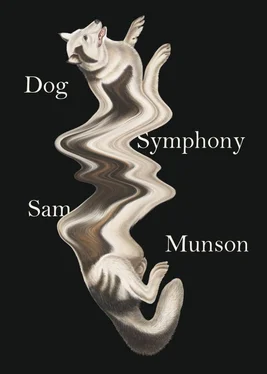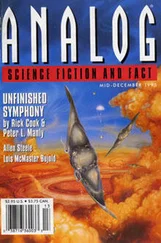WHEN I RETURNED TO the Pensión Vermesser, Violeta was shaking meat from a silver bowl into a silver bag by the steps. The morning was overcast, the sky milk white. You keep student hours, Mr. Pasternak, said my hostess.
I sat on the chilly steps and observed her. I had not slept, not at all, and though my headache had dissipated, my eyelids abraded my eyes every time I blinked. I found myself forgetting, from moment to moment, the placement of my feet, my hands, my cigarettes. Images from the roof garden trembled in my memory. The ease with which the dark-haired woman had struck down the pack of dogs, one after the other. A truly philosophical demolition. I did not understand why the University was engaged in sponsoring such fights, even if only indirectly. And Violeta’s “explanation” did not help. The clubs of Hecate, she said, that’s what they call themselves. She’d never personally seen any that centered around betting on fights, but knew of gatherings that met regularly to bet on other night-dog activities — the speed with which a certain dog will reach La Chacarita, for example, or whether this or that meat bowl will be visited, or even which dog “belongs” to which human family, all these existed and were even well known; La Nación had recently published an article on them called, she thought, “Fortune’s new friends.”
And I hope, she went on — perhaps because I said nothing — that the dogs haven’t lowered your opinion of the city. I always sleep through their appearance and in any case my immediate family is all alive, as far as I know. That’s why I just refreeze and defrost the same steaks, she said, they never visit me anyway, and you have to save money where you can. Before I could ask the next logical question, i.e., why she put out bowls at all if the dogs never came to the Pensión Vermesser, she was already smiling and speaking: And you know very well, Mr. Pasternak, that as a hotelkeeper I have to go along with tradition, even if I am skeptical of it. Otherwise my business would suffer.
My need to speak with Ana, to confirm her involvement in all this, had deepened during my long walk home. The jubilant screams from the small segment of the crowd that bet on the woman and the disgusted sighs from those who had bet on the dogs — these I recalled with perfect clarity. I did not object to the killing of the dogs. The only alternative was for the woman to have been torn apart by their teeth, as if by a storm. The scene had nonetheless left me uneasy. Yet if Ana was involved with this, then I too could permit myself to remain involved. A sophomoric induction, Pasternak. I tried to find Ana’s personal phone numbers, home and cellular, but I discovered that her entry in my address book contained only her phone number at the University. This increased my dizziness, and revived the floodlit nausea I had experienced on the rooftop. I remembered having written down her personal phone number sometime during our third year as friends, while she was reading Pascal in my bed, in a stiff wavering circle of lamplight. Or possibly Gogol. Yet now: nothing. As if in disproof of the esoteric theories I was beginning, automatically, to construct, my books lay open and naked on the desk, my spare shirts hung whitely in the closet, my socks and underwear cowered in the uppermost dresser drawer, and my razor stared from the migraine-yellow porcelain cup on the sink rim. All where I had left them, all as I had left them. Sleeping the trustful sleep of objects.
The phone book on the table listed four Mariateguis. One was Violeta’s doctor friend; the two others also had male first names. The third was a woman, and though her first name, Jacinta, was not my colleague’s first name, I tried anyway. I reached an answering machine, which played a long segment of the Dog Symphony before the message began. The woman it belonged to was clearly young. Her voice was an octave higher than my colleague’s. I left nine or ten seconds of silence on her answering machine as retribution. The lilac stems in the vase next to the telephone, curved like two canine grins, mocked me. I could think of nothing else to do, so I called her number at the history department again, expecting either the goatish song of the busy signal or sheer nothing. To my shock, a male voice answered after the first ring: Department of Social Praxis. It was so similar to Sanchis Mira’s that I slammed down the greasy, green receiver in fear. Sweat lined my armpits, my perineum, my forehead. The ashen taste of the Macedonias, a really putrid brand, lined my mouth. Violeta’s song cut off and then resumed indoors. I lifted the phone and dialed yet again. The dry male voice announced once more: Department of Social Praxis. I asked for Dr. Ana Mariategui and the operator told me to wait. During the pause, I heard nothing, at first, and then a cheap and melancholy piano tune, which I recognized but couldn’t identify. All music says the same thing, in the end. There’s no need to specify what it is. Yet I struggled to recall the name of this melody and failed. The operator came back on and said that Dr. Mariategui was not available, but that he would be happy to pass on a message to her. I asked if I could come see Dr. Mariategui, what her office hours were. I added that I was a visiting academic she had sponsored, that I was attending a conference, but the operator interrupted me before I could explain about my field of research.
You need to come in to discuss such matters, sir, he said (I realized his voice was nothing like Sanchis Mira’s, nothing at all) and began without preamble to read a list of dates and times. I missed the first three and asked him to repeat them. He answered: Do you want to resolve the issue or should I just report you to our administrators? The earliest time we have, in any case, is the day after tomorrow, is that soon enough? I told him no and apologized (for what crime I did not know). The operator said nothing. Hello, I said, hello? One moment, sir, said the operator, I want to make sure I am getting this down correctly. You are declining to come in for an interview. I assured him that there was no need for me to come in, I merely needed an address. Coming in for an interview is in my experience the best way to handle matters of this kind, sir, said the operator. His voice was clotted. As if with hidden laughter. I replied that I did not have the time at the moment, though I regretted this fact. It is regrettable, sir, said the operator, and asked me how to spell my last name. I did; I waited for him to ask if I was related to the famous Pasternak, the author of Doctor Zhivago . But he did not. He coughed, or grunted, or choked back another laugh, and said that he was now seeing an address entered in the record for Dr. Mariategui: Avenida Julio Zenz 4300. I thanked him. The saliva filling my mouth blurred the word; droplets spurted out onto the octagonal table, and a few, to my disgust, even hit the lilac. If you should decide to come in, sir, he went on, as I highly recommend, please remember to bring an ID and proof of travel. A plane ticket, anything like that. Otherwise we would have no idea whether you actually came to Buenos Aires.
The city atlas I’d brought with me (my memory for maps is tremendous but not infallible) did not depict Avenida Zenz. No mention in the index and none in the brief, dead biographies of famous sites the atlas offered as ancillary entertainment. I peered and peered through a magnifying glass framed in frail puce plastic and attached with a nylon cord to the book itself, but I saw no Zenz; in the lowest desk drawer I found a telephone directory and was leafing through it in the hopes of discovering a dweller on Zenz at random — a desperate, frivolous hope, I admit — when Violeta called to me from the parlor threshold. She was flushed from the housecleaning. She carried a blue-and-white checked rag and a plastic spray bottle full of pinkish liquid (like blood and rendered fat, mingling). Sweat beads decorated her hairline, and through the loose armholes of her shirt I saw the dark tufts in her deep axillae flaring. She asked me if something was wrong. I assured her that no, everything was fine, that I was fine. She told me I looked exhausted, though my exhaustion had long since left me, it had drained away on my journey home, or during the rooftop events, or at another point in the ichorous flow. I explained my predicament. She knew exactly where Avenida Julio Zenz was. I was ashamed. After all, so far I had conducted my (external) affairs with perfect alacrity and poise, and the Zenz affair represented a defeat, that I could not deny. She said Zenz was a new street, or a new name for an old street in La Boca; it used to be Parker. The writer it was renamed to honor just died, she said, in the epidemic. There’s no way they could have updated the maps. So don’t blame yourself, Mr. Pasternak.
Читать дальше












